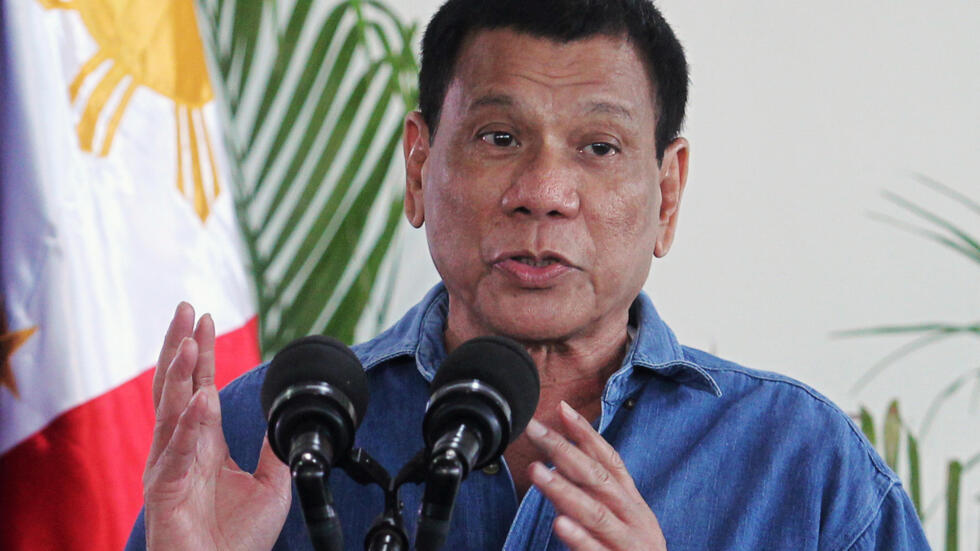Philippines president kowtows to China
The President of the Philippines, Rodrigo Duterte on Tuesday started a four-day visit to China. Relations between the two countries are strained after a ruling by the Permanent Court of Arbitration in favor of Manila’s claims over islands in the South China Sea, but Duterte seems willing to change course at the expense of relations with Washington.
Issued on:

Duterte is taking a line that is completely different from his predecessor, Benigno Aquino, who took a confrontational stance against Beijing, taking China to court over the Spratley island group.
On July 7, the Permanent Court of Arbitration in The Hague ruled that China has no jurisdiction over the waters it claims within an area it marks on its maps with a "nine-dash line". China angrily rejected the decision.
The ruling comes at a time China is actively building military facilities on islands that are also claimed by the Philippines.
During his election campaign, Duterte said he would "go on a jetski to the Islands to plant the Philippine flag".
But he has considerably toned down this rhethoric, and even even indicated that he would be open to hold military exercises with China and not with the United States.
And in his first hundred days in office, he has been very negative towards the US, even offending the US president, and saying that he would review the security agreement between Washington and Manila.
He has no idea what he is doing as president of the country internationally.
Duterte goes to Beijing
“He has no idea what he is doing as president of the country internationally,” says Carlyle Thayer, a military analyst with the Australian Defense Force Academy.
“He has a history of being worried about CIA involvement in Southern Philippines and attacking Islamist groups, and he's now becoming very unpredictable.”
Moreover, he adds, Duterte’s rhetoric starts to annoy US allies in the region. “His anti-American line has made countries like Singapore and others in the region, extremely worried about where he is going,” says Thayer.
Meanwhile, others think Duterte doesn’t win anything from confrontation with China.
“I don't think it is about shifting allegiances, says Michael Vatikiotis, the Asia director for the Center for Humanitarian Dialogue.
“I think it is about seeking as much as possible to reduce the levels of tension and confrontation between the Philippines and China in the South China Sea.
“As he put it recently, he has a choice. You can argue about sovereignty, or you can talk about what it takes to prevent the outbreak of war.
“And I think what he has chosen to do to basically go there, and talk about perhaps a relationship that is more in line with one that requires less tension, less confrontation and therefore is good for the security of the Philippines,” he says.
But how does this affect the relations between Manila and Washington? The Philippines counts as one of the most important allies in East Asia.
At this point the US doesn’t do anything, it just listens.
When Duterte offended US President Barack Obama at the eve of the G20 meeting in Laos, Obama reacted by canceling a scheduled meeting. But no further action was taken. The relationship seems to be on hold.
“Obama is not responding to Duterte's remarks when he says he wants to pulling off US Special Forces from the Philippines and stopping military exercises.
“The US has exhibited remarkable restraint. And I think Obama just told everybody to keep their mouth shut, get through to the November elections, and leave it to the next president to deal with, because no matter what the US does, Duterte will react negatively,” he says.
But analysts say the posturing with regards to the US is more aimed at a domestic audience.
“The Philippines has gone through several phases after being colonized by the US in the end of the 19th century of a sort of a love-hate relationship with their former colonial power,” says Vatikiotis
“In the 1990s of course there was a period of intense nationalism and the US bases were shut down and then they were brought back 15 or more years later.
“And under the latest agreement the US would have the right to use up to thirty places for the positioning of US forces.
“What Duterte has done is essentially play on the ambivalence that the majority of the people in the Philippines have in the US,” he says, adding that in approaching China, Duterte engages in a balancing act answering. the need to continue to assert the sovereignty of the Philippines and not give it away, and on the other hand establish a better working relationship with China.
“They don't want to be in one camp or the other,” he says.
Daily newsletterReceive essential international news every morning
Subscribe